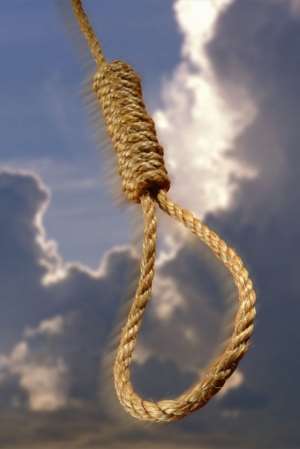
Some religions, in the name of the god they serve, or even in the name of the almighty God, always pronounce the death penalty in some of their sentences on the breach of laws. Aside from religion every society in the world, according to records, in one way or the other has practiced capital punishment before. Up to date, some states as well, have in their constitutions the death penalty as a form of sentence. The question is, are the guilty really guilty that they deserve to die? How would the authorities turn back the hand of time when they realise the guilty are not really guilty? Does this punishment really serve as a deterrent for other people not to commit the same crime? No one with intent commits a crime knowing definitely that his or her judgment would be capital punishment.
Apart from one not being in his or her right senses, any right thinking member of the society, surely will commit a felony, either in a moment of passion or anger. Surely, it is the opinion of some members of society that corporal punishment or custodial sentences are indeed too lenient a punishment for people who commit such monstrous acts, however an alternative, like life imprisonment, can go long way in serving as a lesson to society. In Ghana, capital punishment is on the statute books, but has rarely been carried out.
What is capital punishment/death penalty?
The death penalty, owing to how drastic it is, is being fought against by a lot of human rights organisations for countries to abolish it totally from their statute books. So far, among the 138 existing nations in the world, 92 have abolished the sentence and practice of it and 10 have abolished it. According to the Wikipedia website, capital punishment, the death penalty or execution, is the killing of a person by judicial process for retribution and incapacitation. Retribution is the practice of “getting even” with a wrongdoer — the suffering of the wrongdoer is seen as good in itself, even if it has no other benefits. Incapacitation is a justification of punishment that refers to when the offender's ability to commit further offenses is removed. It is usually undertaken by either injection of lethal chemical injection, firing squad, electrocution, hanging, stoning or sometimes in a gas chamber.
In 2008 the worldwide execution rate was 2,390, with China responsible for executing approximately 1,740, Iran 342, Saudi Arabia 102, Pakistan 36, the United States 37, and Japan 15. During a programme organised by Amnesty International, it was discovered that the death penalty does not only apply to murder, however depending on the country other offences considered a felony are given capital punishment. For instance, in Iran crimes such as apostasy from Islam and homosexuality are capital offenses. The former Chinese Director of the State Food and Drugs Administration, Zheng Xiaoyu, was put to death by the state after being charged with corruption, and Pakistan executes those it finds guilty of blasphemy.
Society and capital punishment/death penalty
In Ghana capital punishment though found in the 1992 constitution is not being implemented, her last execution by law was in 1993, when 12 prisoners convicted or armed robbery or murder were executed by firing squad.
According to the Executive Director of the Legal Resources Center, Mr. Tuinese Edward Amuzu, the irreversible nature of the death penalty, should alone be enough to convince any policy of the excessive and unjust nature of the death penalty.
Even the best of human criminal justice procedures in countries that truly seek to execute only the worst violent criminals, make mistakes and wrongfully convict at least a small number of those it tries. Moreover, the execution of prisoners is not an effective or useful law enforcement tool, even in the cases where it is meant to be a legitimate punishment for serious violent crimes it does not prevent or reduce crime. He noted that countries that use the death penalty, even in good faith, run a serious risk of executing the innocent, and there are many capital cases around the world that were not tried in good faith.
For Mr. Augustine Sampah, a retired prisons officer, capital punishment is a violation of the human right, especially for the poor and vulnerable who do not have enough resource to prove their innocence. If the real purpose of conviction and judgment is to reform the guilty one into a better person, what will then be the essence of judgment when the supposed guilty person does not exist to experience the reformation? Even though in the issue of murder, the death penalty is considered to be consolation for the bereaved family, it does not mean it will bring the murdered person to life. One must also bear in mind that since we are just humans, mistakes are inevitable. Murder in certain instances could be manslaughter.
To Mr. David Kumah, a carpenter, he supports the idea of the death penalty, but demanded that thorough investigations be done, and also the judges and the jury should empathise with the accused, especially when one is just a victim of circumstance. In-depth investigation is needed so as to make sure there is no miscarriage of justice. He went to an extent of giving an instance of an incident that happened last year about a man who purposefully killed a cousin in the farm, cooked and ate him like a cannibal. According to him, this person, in this aspect, needs to not be pardoned since he was caught in the act and seemed to have no regrets.
Alternative to death penalty/capital punishment
When a person is given a death penalty, whether guilty of not, the possibility of a loved one or a close family relation avenging is there. The loved one could avenge by killing the judge of the case, the jury, the witnesses and even wipe out the whole family of the victim.
At certain point in time, when the offence committed is suspected to be conceived due to mental problems, the person is better off referred to the rehabilitation center, for rehabilitation. According to the Medical Law of Rehabilitation, the purpose of rehabilitation is to restore an injured person to a productive and independent lifestyle, as soon as possible, through the use of medical, functional and vocational therapies. Rehabilitation includes assisting the patient to compensate for deficits that cannot be reversed medically. States, which still hold on to the sentence of capital punishment can amend their laws. Life imprisonment without the possibility of parole would give them the opportunity to mend their ways for the better, which is an acceptable alternative.
Conclusion
Research by Amnesty International has shown that the death penalty is often applied in a discriminatory manner. It is used disproportionately against the poor, minorities and members of racial ethnic and religious communities; it is often imposed after a grossly unfair trial. Even during fair trials the risk of executing the innocent can never be fully eliminated. The death penalty has not been proven to have any deterrent effect, and it denies the possibility of rehabilitation. The death penalty violates the right of life, and is the ultimate cruel, inhuman and degrading punishment. Therefore, to Mr. Edward Amuzu the government must respect their obligation as human duty-bearers, and implement the United Nation's General Assembly's Death Penalty Moratorium, which calls for an immediate stop to the use of this barbaric method of punishment in all circumstances. One might not put it into consideration that the more people are executed, the lesser the labour force in the world becomes, if that be the case, then how do we expect the future economy of the world to look like?




 Let’s regularise offices of First and Second Ladies – Martin Kpebu
Let’s regularise offices of First and Second Ladies – Martin Kpebu
 GRA-SML deal: KPMG’s selection an illegality, unprofessional behaviour – Domelev...
GRA-SML deal: KPMG’s selection an illegality, unprofessional behaviour – Domelev...
 Prof Jane Naana can’t point to any notable achievement – Eric Twum
Prof Jane Naana can’t point to any notable achievement – Eric Twum
 Pointing out the ills of NPP government not enough; tell us what you can do — Mi...
Pointing out the ills of NPP government not enough; tell us what you can do — Mi...
 April 27: Cedi sells at GHS13.78 to $1, GHS13.18 on BoG interbank
April 27: Cedi sells at GHS13.78 to $1, GHS13.18 on BoG interbank
 Worry about the furniture problem in basic schools; not how to paint schools in ...
Worry about the furniture problem in basic schools; not how to paint schools in ...
 Ramaphosa lauds ANC record as S.Africa celebrates democracy
Ramaphosa lauds ANC record as S.Africa celebrates democracy
 Ghana needs new counter-terrorism Act to tackle radicalised youth – CISA
Ghana needs new counter-terrorism Act to tackle radicalised youth – CISA
 Kumasi Central Prison triple its capacity to 1800 inmates
Kumasi Central Prison triple its capacity to 1800 inmates
 By-election: Ejisu is destined for NPP – Ahiagbah
By-election: Ejisu is destined for NPP – Ahiagbah
